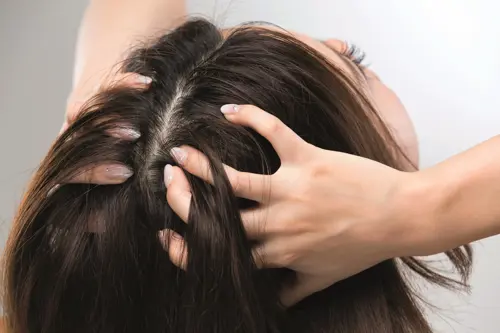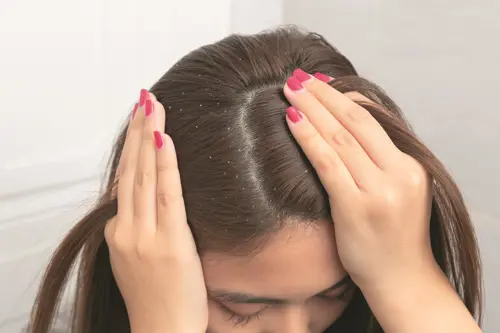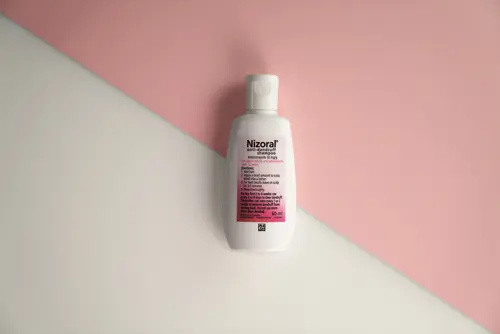SCALP TENDERNESS - WHAT'S CAUSING IT?
If a tender or sore scalp has got you scratching your head for answers, you’ve come to the right place. Sometimes, this type of pain can feel like it’s actually your hair that’s hurting, when the pain is really coming from lots of super sensitive nerves under your scalp.
Scalp tenderness could have many different causes, and we’ll look at some of them in this article. Read on if you want to find out some of the scalp conditions that could be making your head hurt – as well as what you can do.

CAUSES OF PAINFUL AND TENDER SCALP
Most of the time, pain that comes from your scalp isn’t anything serious. In fact, many cases of scalp tenderness can be treated at home.
A painful scalp can have a few different causes, like:
- Headaches
- Eczema
- Dandruff
- Scalp folliculitis
- Contact allergy
- Scalp psoriasis
- Seborrhoeic dermatitis
- Ponytail headache
There can also be other reasons for the pain you’re feeling – particularly in colder months. The dry and cold weather that often hits the UK in winter can make us experience extremes in temperature. If your scalp is exposed to freezing cold air outside and then warm central heating inside, it can dry out your scalp and cause flaking and tenderness.
Both of these conditions are caused by the same type of fungus – but their symptoms can vary. Dandruff tends to cause small white flakes to appear near the scalp – and it might be accompanied with a bit of itching. However, seborrhoeic dermatitis is more severe and you might also experience redness and scaling of the scalp.
Luckily, both conditions can be detected and treated easily. If you aren’t sure if you have dandruff or seborrhoeic dermatitis, you should ask a doctor or pharmacist for advice. In most cases, they should be able to tell whether you have dandruff or seborrhoeic dermatitis just from the appearance of your scalp, as well as your symptoms.

WHY DOES MY SCALP HURT WHEN I MOVE MY HAIR?
If your scalp hurts when you move your hair, it could be down to irritation. There can be a few different reasons for scalp irritation, such as hair products or the way you style your hair.
It’s always a good idea to make sure that you aren’t allergic to any of your regular haircare products. Allergies can sometimes cause skin reactions, and your scalp is no exception.
There could also be other underlying causes of scalp pain when moving your hair. These include skin problems that affect the scalp, as well as some conditions that can cause nerve pain under your hair.
WAYS TO RELIEVE PAIN AND INFLAMMATION
The one thing everyone with scalp tenderness wants to know is how to relieve the pain. Even though the tenderness & inflammation can be irritating, the good news is that in many cases, it can be treated in just a few weeks.
Unfortunately, there isn’t a one-size-fits-all remedy for scalp pain, but there are various things that you can try to ease the tenderness.
FOR SCALP ITCHING
If your scalp is still itchy and irritated, you might want to stop using any products that might be causing the pain. Some people can develop an allergic reaction to products that they’ve used for a long time, and it can sometimes explain scalp tenderness. We suggest using as little product on your hair as possible for a while to see if your symptoms improve. You could even try a different type of shampoo or conditioner in case either of these could be the culprit.
FOR DANDRUFF OR SEBORRHOEIC DERMATITIS
If you know you have dandruff or seborrhoeic dermatitis, you might want to try Nizoral. Nizoral starts working from the first hair wash and helps to treat the cause of dandruff rather than just the appearance of it. It’s available over the counter in most pharmacies and has clinically proven efficacy to control itching and flaking.
FOR SORENESS IN WINTER
We already know that colder weather and warm central heating can play a part in causing a sore scalp. One way of combating this is to wear a breathable hat when you’re outside in winter. This means choosing fabrics like wool or cotton to allow air to get to the scalp without causing a drying effect.

To prevent scalp tenderness day-to-day, you should always make sure that you’re being gentle with your hair and scalp. This could mean avoiding harsh or drying ingredients, or just brushing your hair more slowly and with more care. No matter what kind of brush you use for your hair, make sure that you brush gently, start from the ends and work up to the roots. Any kind of tension can contribute to scalp tenderness, so it’s worth keeping this in mind when you’re styling your hair.

WHEN SHOULD YOU ASK FOR ADVICE?
Although most types of scalp tenderness can be treated easily, some scalp conditions will need treatment from a doctor. If you notice anything else on your scalp, such as spots or open wounds, you should make an appointment with your GP. Whilst it might not be serious, it’s always worth getting it checked out.
It’s also a good idea to talk to your doctor if you’ve been using any treatments on your scalp but haven’t seen an improvement after 3-4 weeks. Most over-the-counter treatments for scalp conditions should start working within this amount of time. If your scalp pain hasn’t got any better with treatment, you might need something else.
Scalp tenderness is fairly common, but we would still encourage you to keep an eye on it and see a doctor if it starts to concern you.
Conclusion
Being gentle with your scalp is the key to keeping it healthy! Make sure you’re using products that are kind to the skin. It’s also a good idea to start thinking about new hairstyles to avoid a tender scalp. Allowing your hair to sit naturally can prevent the amount of pain you experience from tight hairstyles, so what are you waiting for? It’s time to let your hair down and show your scalp some love!


